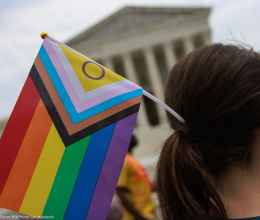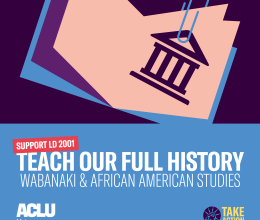For our annual holiday party last week I was tasked with providing music, which I took as a great excuse to assemble a collection of civil rights- and civil liberties-themed songs. Hoping to show how these types of songs have progressed over time, I made a point of picking at least one tune from every decade beginning with the 1930s. It’s fascinating to hear how much has changed in the sound of music over that time, yet sobering once you recognize just how many of the themes from those early songs are still just as relevant today.
If you’re a Spotify user, we’ve made the playlist public and you can listen to it here. In case you’re not on Spotify – or if you’re just curious to learn more about some of the songs that made the cut – the collection is included below with a brief note about each song. (Dates are presented to the best of my ability, but it can be tough to trace the first release for every song in a consistent way, particularly back in the 40s, 50s and 60s, so there may be some minor discrepancies.)
As you might imagine, this barely scratches the surface of great civil rights songs so please don’t interpret this as a "top 20" or anything along those lines. In fact, it’s just a starting point and we’d love to hear from you so that we can expand it even further! If you have a favorite song that connects to civil rights or civil liberties, follow us on Facebook or Twitter and send us your picks.
Strange Fruit, Billie Holiday (1939) – First written as a poem by Abel Meeropol, Billie Holiday’s moving rendition of this song about racism and lynching is as poignant as they come.
This Land Is Your Land, Woody Guthrie (early 1940’s) – Not surprisingly, the final verses of this classic protest song are frequently omitted, yet they are worth reading in their entirety to understand the full message Guthrie was trying to convey.
We Shall Overcome – Like many folk songs, this powerful symbol of the civil rights movement is without a single author or definitive release date. It is truly a communal song that has evolved over time but always manages to symbolize defiance, strength, and hope in the face of injustice.
Ain’t Gonna Let Nobody Turn Me Around – Another “freedom song” without a definitive author or release date that became a staple of the Civil Rights Movement in the 1950s and 1960s.
When Will I Get To Be Called A Man, Big Bill Broonzy (1957) – This plaintive blues number from Big Bill Broonzy is a great example of the many racial justice songs that appeared throughout the blues genre during this era. (Five years later, Bob Dylan would closely echo the theme of this song with his famous opening line to Blowin’ In The Wind: “How many roads must a man walk down before you call him a man?”)
Alabama, John Coltrane (1963) – Coltrane wrote this song immediately after the 1963 bombing of the 16th Street Baptist Church in Alabama killed four young girls. He is said to have modeled his solo after the pattern used by Dr. Martin Luther King Jr. in his speech eulogizing the slain girls.
Louie Louie, The Kingsmen (1963) – Though the lyrics of this song are about as mundane as the rhythm is catchy, The Kingsmen’s version (which was actually a cover of a Richard Berry tune from 1955) featured such mumbled lyrics that the censors of the era went ballistic. Rumors of obscene lyrics were so prevalent that the FBI commenced an investigation, but alas they came to find out it was just another love song. It now resides in the long annals of censorship gone wrong.
Only A Pawn In Their Game, Bob Dylan (1964) – This song, performed by Dylan at the iconic March on Washington for Jobs and Freedom, was somewhat controversial for its perspective on the killing of Medgar Evers. Dylan seems to take the blame off of Evers’ killers and places it instead at the feet of the larger system of oppression and racism perpetuated by wealthy and elite whites.
A Change Is Gonna Come, Sam Cooke (1964) – Another moving anthem of the civil rights movement, this song has been covered by far too many artists to name yet Sam Cooke’s original remains the definitive version. (It was also employed by Spike Lee with a melancholic brilliance as the musical precursor to Malcolm X’s assassination in his 1992 biopic.)
Mississippi Goddam, Nina Simone (1964) – First released on a 1964 live album, this song was also sung by Simone at one of the Selma to Montgomery marches. Her cynical comment in between verses of the recorded version is worth repeating: “This song is a show tune, but the show hasn't been written for it yet.”
Respect, Aretha Franklin (1967) – This song was originally written by Otis Redding and released in 1965, yet it is Franklin’s version that has lasted the test of time – and for good reason too. She reclaimed the meaning of the song from Redding and turned it into one of the great anthems of the women’s rights movement.
Ohio, Crosby, Stills, Nash and Young (1970) – Neil Young wrote this song in response to the Kent State shootings of May 1970, which left four unarmed college students dead and a wealth of questions behind.
Man In Black, Johnny Cash (1971) – Twisting his own nickname into a protest song, Johnny Cash penned this number as a reminder “of the ones who are held back,” saying he wears black for those like “the prisoner who has long paid for his crime, but is there because he's a victim of the times.”
Police On My Back, The Clash (1980) – This upbeat number from The Clash about an innocent man running from police is clever in that it is both serious and humorous at the same time.
Sunday Bloody Sunday, U2 (1983) – Writing about the killing of 14 civil rights protesters in Northern Ireland during the early 1970s, U2 scored a hit with this song and a chorus line that could seemingly have been taken from almost any of our early folk protest songs: “How long must we sing this song?”
Fight The Power, Public Enemy (1989) – Written at the request of Spike Lee, who needed a theme song for his film, Do The Right Thing, this classic Public Enemy song touches on many issues related to race and civil rights.
Killing In The Name, Rage Against The Machine (1992) – With loud and angry lyrics about police brutality and institutional racism, this song does not hold back and represents frustration with authority in a much more musically intense way than anything else on this short list.
41 Shots (American Skin), Bruce Springsteen (2001) – Springsteen wrote this song as a direct commentary on the 1999 killing of Amadou Diallo, who was shot at 41 times by four different police officers after they mistook his wallet for a gun. All four officers were acquitted, prompting widespread protests across New York City and beyond.
Standing In The Way of Control, Gossip (2006) – This song was written in response to the Federal Marriage Amendment and other attempts to outlaw same-sex marriage throughout the United States.
Transgender Dysphoria Blues, Against Me! (2013) – As personal and compelling a narrative as you will find in music today, Transgender Dysphoria Blues is the lead single from an album of the same name. In it, Laura Jane Grace tells her story as a transgender woman dealing with a public transition as the face of her hard-rocking punk band.
Once again, you can find all these songs on our Spotify playlist here. Enjoy!






